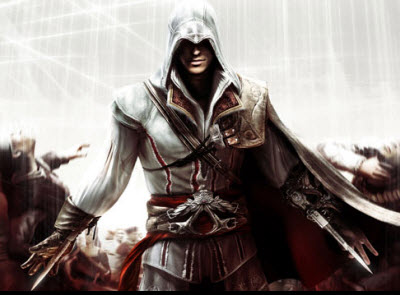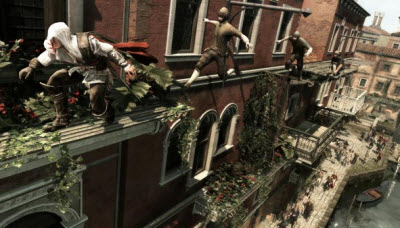 Ubisoft, the French video-game publisher, is playing a high-stakes game against U.S. rival Activision Blizzard, testing gamers’ appetites for two near-simultaneous mega-franchise releases with its highly anticipated Assassin’s Creed Brotherhood due out tomorrow.
Ubisoft, the French video-game publisher, is playing a high-stakes game against U.S. rival Activision Blizzard, testing gamers’ appetites for two near-simultaneous mega-franchise releases with its highly anticipated Assassin’s Creed Brotherhood due out tomorrow.
It’s another sign of the Hollywoodization of the video-game industry. Instead of jostling for space at the multiplex, big game studios are betting large budgets on capturing living-room screens.
Just as movie studios time film releases to avoid bumping into blockbusters and hence fracturing the audience into unprofitable slices, most game publishers would avoid going head-to-head with Activision’s just-launched Call of Duty Black Ops.
But on two prior occasions Ubisoft has done just fine, selling more than 19 million units of the previous Assassin’s Creed games worth more than $1 billion at retail. Ubisoft launched the original Assassin’s Creed in November, 2007, just after Call of Duty 4 Modern Warfare launched. And it launched Assassin’s Creed II a year ago, just after the launch of Call of Duty Modern Warfare 2.
“It has become our traditional launch date,” said Tony Key, senior vice president of sales and marketing for Ubisoft in North America, in an interview. “Fortunately, in the past, Call of Duty hasn’t had a negative impact.”
Tradition or not, the strategy is risky. Games command a consumer’s attention for far longer than a two-hour movie, and gamers are still playing Black Ops, which saw more than $350 million worth of sales in just 24 hours after its launch on Nov. 9. The popular multiplayer version of Black Ops will likely keep a lot of gamers occupied. So the Assassin’s Creed Brotherhood title has a lot to overcome to be successful.
Assassin’s Creed Brotherhood is getting early praise for both its extensive single-player campaign and its new multiplayer mode, where you try to hide in a crowd and find other assassins before they kill you. I’ve played the beta version of that multiplayer mode and it is a lot of fun. The game is a critical one for Ubisoft, which lost money in the past two quarters ended Sept. 30. Two earlier games, Tom Clancy’s Hawx 2 and Ruse, didn’t sell as much as Ubisoft expected in the quarter.
 But the Brotherhood game is one of a trio of hot titles for Ubisoft this fall; the others include the already-launched Just Dance 2 for the Wii and the upcoming Michael Jackson The Experience coming out on Nov. 23. Another title with good potential is Your Shape Fitness Evolved, a fitness game for Microsoft’s Kinect motion-sensing system, which has been selling well since Kinect launched earlier this month. Ubisoft will be spending a considerable amount on TV ads and other ads to make sure that Brotherhood takes off.
But the Brotherhood game is one of a trio of hot titles for Ubisoft this fall; the others include the already-launched Just Dance 2 for the Wii and the upcoming Michael Jackson The Experience coming out on Nov. 23. Another title with good potential is Your Shape Fitness Evolved, a fitness game for Microsoft’s Kinect motion-sensing system, which has been selling well since Kinect launched earlier this month. Ubisoft will be spending a considerable amount on TV ads and other ads to make sure that Brotherhood takes off.
Although the last big Assassin’s Creed game launched just a year ago, Key said the company was able to gather the resources of more than 500 game developers across four studios and crank out a new title this year. Full told, the Brotherhood team took two years to make the game. But since it used an existing, battle-tested game engine originally developed for Assassin’s Creed, the team is able to work quickly.
“The model is changing for the game industry,” Key said. “This isn’t a matter of time. It’s a resource issue. If you put enough resources into the making of a major game, you can get it out in a year.”
In the past, game publishers would launch a big game and then follow it up with a smaller, related title, dubbed an expansion pack. But the giant blockbuster games are in the unique position of being able to throw a ton of developers at a franchise and come out with a game every year. That is what Activision Blizzard is doing with Call of Duty and what Microsoft has started to do with Halo.
The higher costs associated with developing such games help explain the current losses, although Ubisoft says it has reduced costs. Ubisoft has also been spending more money on digital online games, such as the companion game for Assassin’s Creed Brotherhood that it launched on Facebook. Ubisoft is also investing heavily in Uplay, its online games services. The company said it expects the online games segment will grow 25 – 30 percent in the fiscal year ending March 31, 2011.
Ubisoft said that pre-orders for the Brotherhood game — a good measure of potential demand — are ahead of expectations. Key said the company will ship more games on the first day than in the past because the sales channels are fully stocked. The new game uses the same main character from last year’s game, Ezio, a master assassin who is now building up an army of assassins to take on his traditional enemies in a game set during the Italian Renaissance. Ubisoft is launching a marketing campaign focused on letting players build their brotherhoods on YouTube and on other online locations.
“Pre-orders are at 25 percent above last year and initial comments are highly positive about the single player and multiplayer game,” said Yves Guillemot, chief executive of Ubisoft, in the company’s earnings call today.
In negative news, the company further delayed the launch of two games: Tom Clancy’s Ghost Recon Future Soldier and Driver San Francisco. Both were previously planned for the fourth fiscal quarter ended March 31, but now they will launch later in 2011.
VentureBeat's mission is to be a digital town square for technical decision-makers to gain knowledge about transformative enterprise technology and transact. Learn More
